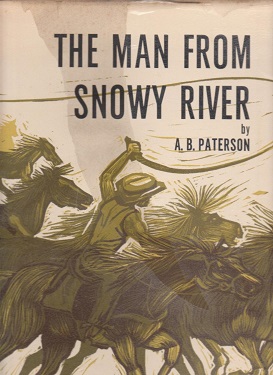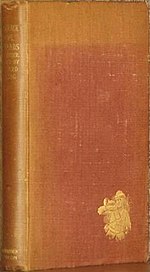
Joseph Rudyard Kipling was an English novelist, short-story writer, poet, and journalist. He was born in British India, which inspired much of his work.
This is a bibliography of works by Rudyard Kipling, including books, short stories, poems, and collections of his works.
"Gunga Din" is an 1890 poem by Rudyard Kipling set in British India. The poem was published alongside "Mandalay" and "Danny Deever" in the collection "Barrack-Room Ballads".
"Fuzzy-Wuzzy" is a poem by the English author and poet Rudyard Kipling, published in 1892 as part of Barrack Room Ballads. It describes the respect of the ordinary soldier for the bravery of the Hadendoa warriors who fought the British army in Sudan and Eritrea.

"Danny Deever" is an 1890 poem by Rudyard Kipling, one of the first of the Barrack-Room Ballads. It received wide critical and popular acclaim, and is often regarded as one of the most significant pieces of Kipling's early verse. The poem, a ballad, describes the execution of a British soldier in India for murder. His execution is viewed by his regiment, paraded to watch it, and the poem is composed of the comments they exchange as they see him hanged.

Skimbleshanks is a character in T. S. Eliot's 1939 book of poetry Old Possum's Book of Practical Cats and in Andrew Lloyd Webber's 1981 musical Cats, which is based on Eliot's book. The character is portrayed as a bright and energetic orange tabby cat who lives and works on the mail trains.

"Mandalay" is a poem by Rudyard Kipling, written and published in 1890, and first collected in Barrack-Room Ballads, and Other Verses in 1892. The poem is set in colonial Burma, then part of British India. The protagonist is a Cockney working-class soldier, back in grey, restrictive London, recalling the time he felt free and had a Burmese girlfriend, now unattainably far away.
Nationality words link to articles with information on the nation's poetry or literature.
Nationality words link to articles with information on the nation's poetry or literature.
In the British Army, a gentleman ranker is an enlisted soldier suited through education and social background to be a commissioned officer or indeed a former commissioned officer. Rudyard Kipling titled one of his poems, which was published in 1892, "Gentlemen-Rankers".
The Definitive Edition of the verse of Rudyard Kipling (1865–1936) was published in 1940 in London by Hodder and Stoughton, Ltd and in Edinburgh by R. R. Clark. It is a one-volume collection and was printed on India paper.

"On the Road to Mandalay" is a song by Oley Speaks (1874–1948) with text by Rudyard Kipling (1865–1936).

The Man from Snowy River and Other Verses (1895) is the first collection of poems by Australian poet Banjo Paterson. It was released in hardback by Angus and Robertson in 1895, and features the poet's widely anthologised poems "The Man from Snowy River", "Clancy of the Overflow", "Saltbush Bill" and "The Man from Ironbark". It also contains the poet's first two poems that featured in The Bulletin Debate, a famous dispute in The Bulletin magazine from 1892-93 between Paterson and Henry Lawson.
"Tommy" is an 1890 poem by Rudyard Kipling, reprinted in his 1892 Barrack-Room Ballads. The poem addresses the ordinary British soldier of Kipling's time in a sympathetic manner. It is written from the point of view of such a soldier, and contrasts the treatment they receive from the general public during peace and during war.
"Boots" is a poem by English author and poet Rudyard Kipling (1865–1936). It was first published in 1903, in his collection The Five Nations.
A Choice of Kipling's Verse, made by T. S. Eliot, with an essay on Rudyard Kipling is a book first published in December 1941. It is in two parts. The first part is an essay by American-born British poet T. S. Eliot (1888–1965), in which he discusses the nature and stature of British poet Rudyard Kipling (1865–1936). The second part consists of Eliot's selection from Kipling's poems.
Gerard Francis Cobb was Junior Bursar of Trinity College, Cambridge. He was active as an Anglican layman, organist and amateur composer.
"Soldier, Soldier" is a poem by Rudyard Kipling from Barrack-Room Ballads. The lyrics of the poem are not directly related to the traditional ballad "Soldier, soldier won't you marry me" and instead begin "Soldier, soldier come from the wars, Why don't you march with my true love?"
"McAndrew's Hymn" is a poem by English writer Rudyard Kipling (1865–1936). It was begun in 1893, and first published in December 1894 in Scribner's Magazine. It was collected in Kipling's The Seven Seas of 1896. Some editions title the poem "M'Andrew's Hymn".
"The Mary Gloster" is a poem by British writer Rudyard Kipling (1865-1936). It is dated 1894, but seems to have been first published in his 1896 collection The Seven Seas.






